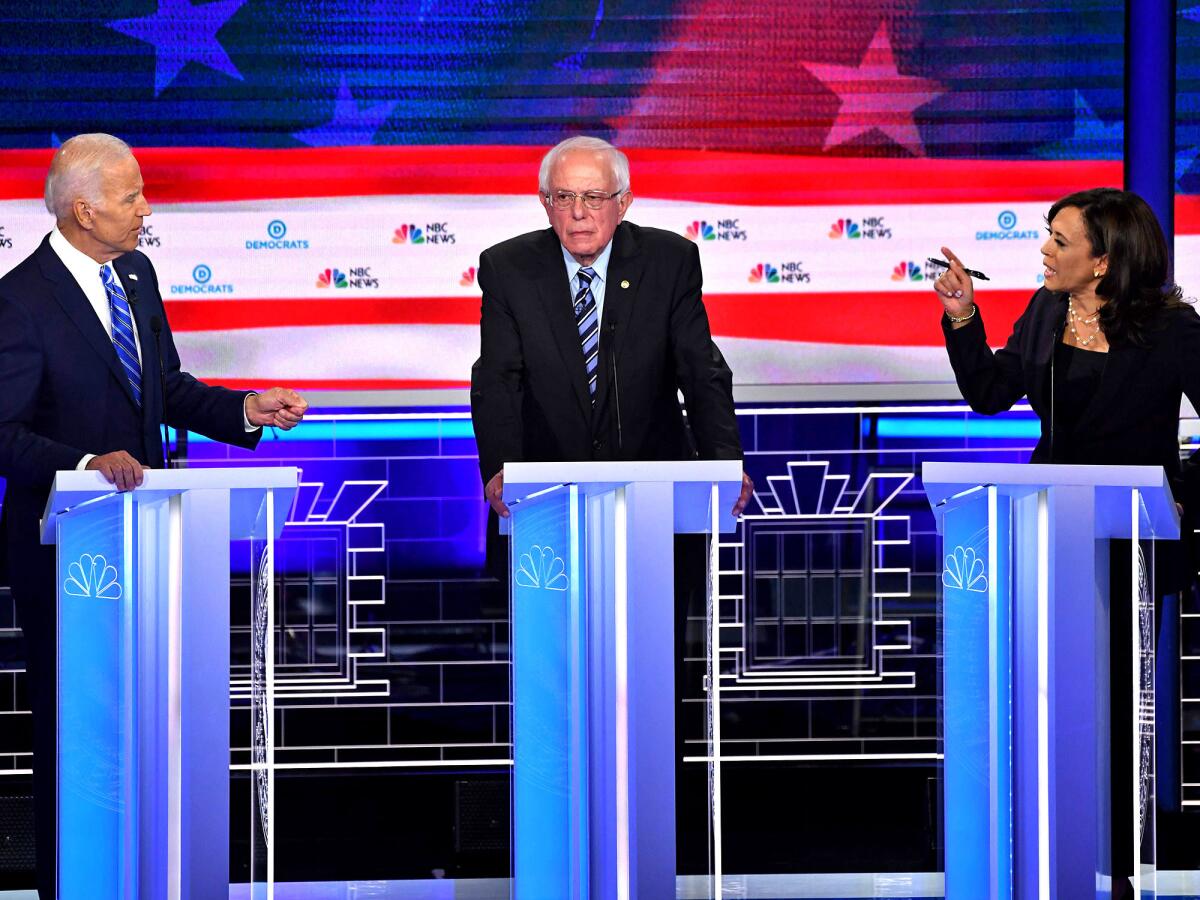Column: Kamala Harris gets her star turn at the Democratic National Convention

WASHINGTON — The acceptance speech by a new nominee for vice president is rarely memorable — and for a good reason.
The ideal running mate steps to the podium with only three goals: to introduce herself to voters, lavishly praise the candidate who chose her, and eviscerate the opposition — all without overshadowing her new boss with too much brilliance.
Does anyone remember what Vice President Mike Pence or Sen. Tim Kaine of Virginia, the Democrats’ 2016 vice presidential nominee, said in their convention speeches four years ago? Not really, which means they did fine.
The only recent exception was Alaska Gov. Sarah Palin’s acceptance speech to the Republican National Convention in 2008, a momentary hit thanks to her zany charm — a quality that did not wear well over the rest of the campaign.
Trump and Biden diverge on the coronavirus pandemic, Obamacare, Medicare and Medicaid, abortion rights, and how to rein in prescription drug prices.
Sen. Kamala Harris of California, the Democratic nominee for vice president, will aim for a more conventional performance tonight — albeit online, not in a crowded convention hall because of the coronavirus — as she tells voters why they ought to replace President Trump.
She will tell her life story as the daughter of two immigrants, and as the first Black and South Asian woman on a major-party ticket. She will extol former Vice President Joe Biden, who heads the ticket, and pit her skills as a former prosecutor against the many failings of the Trump administration.
But Harris’ speech will be more intriguing than most because it will almost certainly include a fourth, unspoken goal: an opportunity to reboot her national prospects after the failure of her own White House bid.
When Harris launched her campaign in January 2019, she won immediate plaudits for her charisma, her compelling personal story and her laceration of Trump’s aides and nominees in Senate hearings.
A cautious, pragmatic liberal in terms of California politics, she sought to position herself in what appeared the sweet spot of the Democratic primary field: a little to the left of Biden, the leading moderate, but several steps to the right of thoroughgoing progressives Sens. Bernie Sanders and Elizabeth Warren.
Harris’ debating skill gave her a boost when she attacked Biden at a Democratic primary debate in Miami in June 2019 for his opposition in the 1970s to school integration through mandatory busing.
“There was a little girl in California who was part of the second class to integrate her public schools and she was bused to school every day,” she said. Then she closed in for the kill: “That little girl was me.”
But her attempts to triangulate policies between left and center flopped. She often seemed indecisive about her positions — a fatal flaw in a campaign that focused on detailed policy debates.
She said she supported Sanders’ health proposal, known as Medicare for All, including its near-total ban on private insurance plans — but then backtracked on that provision.
She said she backed the progressives’ proposed Green New Deal, too, but later said she didn’t subscribe to every part of the climate change program.
Worst of all, perhaps, she never settled on one or two signature priorities beyond arguing that she’s “a fighter” who would be the party’s best bet at knocking Trump out of office.
Most would-be primary voters gravitated to other candidates with clearer positions. Polls showed her drawing less support from Black voters than Biden or Sanders.
By December, Harris’ fundraising dried up and she withdrew from the race, the first major candidate to pull out.
Her new role as Biden’s running mate will probably suit her better than the challenges that stymied her in the primaries.
Back then, she found it difficult to settle on clear positions; now she doesn’t need to. Biden is the decider, and he arrived at his stances months ago. All Harris needs to do is defend them.
As for attacking Trump, that’s arguably been Harris’ main talent all along.
When Biden introduced her as his running mate last week, she uncorked one of the best zingers of the campaign so far. Trump, she said, “inherited the longest economic expansion in history … and then, like everything else he inherited, he ran it straight into the ground.”
She has embraced the most traditional role possible for a vice presidential nominee: as an attack dog who can harass the other side and allow the presidential candidate to maintain a slightly higher altitude.
There’s not much danger that she’ll overshadow Biden tonight. She’s a reasonably good speechmaker, but she’s no Obama — by which I mean Michelle Obama, whose impassioned appeal dominated the first night’s proceedings.
Harris’ greatest test is whether she can use her acceptance speech, and those to follow over the next 77 days, to bolster her own future.
Watch for the unveiling of Kamala Harris 3.0: no longer a former California prosecutor with a hotly debated record, nor merely a reliably liberal senator, but now the loyal sidekick to the Democratic nominee.
She’ll be Joe Biden’s Biden, if you like — a president in waiting.
More to Read
Get the L.A. Times Politics newsletter
Deeply reported insights into legislation, politics and policy from Sacramento, Washington and beyond. In your inbox three times per week.
You may occasionally receive promotional content from the Los Angeles Times.












